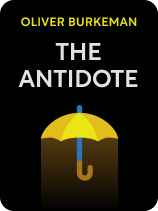

This article is an excerpt from the Shortform book guide to "The Antidote" by Oliver Burkeman. Shortform has the world's best summaries and analyses of books you should be reading.
Like this article? Sign up for a free trial here.
Are you rigid with your goals, or do you give them room to breathe? How do you handle fluctuations in motivation?
Goals are an important part of achievement. But, your approach to setting and fulfilling goals has a big impact on their effectiveness. Oliver Burkeman recommends that you adopt a flexible goal mindset, and he shares three practical tips to move you in that direction.
Keep reading to learn how to change your goal mindset as well as your relationship with success itself.
Your Goal Mindset
Burkeman suggests that you’re more likely to feel happy and accomplished if you shift from pursuing rigid goals to adopting a more flexible attitude, allowing your goals to evolve with your changing desires and circumstances. This approach redefines your relationship to success by making setbacks seem less like failures and more like learning curves that keep your goals in tune with what matters to you.
He recommends three methods for cultivating a flexible goal mindset.
#1: Set Adaptable Goals
Make your goals flexible from the outset and consistently reevaluate them to ensure they align with your evolving needs, circumstances, and aspirations. For example, instead of focusing on one predefined career path, explore diverse roles to enhance your chances of getting a rewarding job. (Shortform note: To ensure your goals remain adaptable, consider adopting a monitoring system like Brendon Burchard’s method in High Performance Habits: Every week, chart your work-life balance by ranking your satisfaction levels in 10 areas, like work and family, then set your goals for the coming week in each area.)
#2: Learn From Failure
Burkeman says you should analyze setbacks and apply your insights to future efforts. This strategy transforms disappointments into actions you can take to improve, helping you sustain momentum toward your goals. For example, if a promotion eludes you, identify and hone the necessary skills to prepare yourself for future opportunities.
(Shortform note: Social psychologists offer constructive advice for learning from failure: Don’t focus on finding fault with who you are. This makes you feel powerless because it attributes setbacks to inherent, unchangeable traits—for example, believing that you didn’t get the promotion because you’re not intelligent enough. Instead, focus on specific, changeable behaviors. This will direct you to specific actions you can take to improve both yourself and your circumstances, and it will help you respond more rationally to setbacks. For example, realizing you didn’t get the promotion because you don’t have enough project management experience indicates an area you can improve.)
#3: Establish Action-Based Routines
Burkeman says to prioritize completing specific tasks regardless of your motivation levels. This approach emphasizes doing over feeling, fostering a commitment to take action that ensures continual progress toward your goals. For example, dedicate the first hour of your day to crucial tasks to guarantee daily advancement regardless of your motivational state.
(Shortform note: On the surface, this approach seems to contradict Burkeman’s advice to adopt flexible goals. However, establishing action-based routines creates a framework for flexible goals to thrive. Think of it as a stable routine that keeps you grounded and proactive, ensuring you make progress irrespective of how your goals evolve. For example, dedicating an hour each day to priority tasks might involve various activities, depending on your shifting goals. One day, it could mean brainstorming for a new project; the next, it might be networking or learning a new skill. This combination establishes a steady rhythm of work while allowing room for adaptability, striking the right balance for consistent progress and evolving goals.)

———End of Preview———
Like what you just read? Read the rest of the world's best book summary and analysis of Oliver Burkeman's "The Antidote" at Shortform.
Here's what you'll find in our full The Antidote summary:
- Why forcing yourself to think positive thoughts doesn't make you happy
- How typical self-help advice can sometimes make you feel worse
- How to experience contentment even amid seemingly negative experiences






